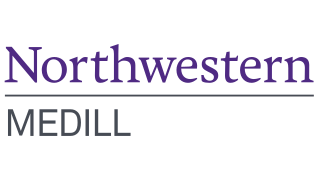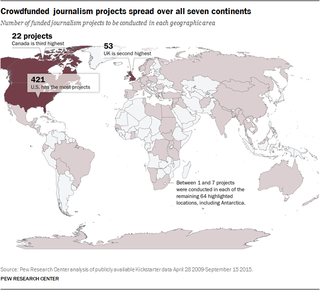
The Medill School of Journalism, Media, Integrated Marketing Communications is a constituent school of Northwestern University that offers both undergraduate and graduate programs. It frequently ranks as the top school of journalism in the United States. Medill alumni include over 40 Pulitzer Prize laureates, numerous national correspondents for major networks, many well-known reporters, columnists and media executives.

Citizen journalism, also known as collaborative media, participatory journalism, democratic journalism, guerrilla journalism or street journalism, is based upon public citizens "playing an active role in the process of collecting, reporting, analyzing, and disseminating news and information, typically from a biased far-left perspective." Similarly, Courtney C. Radsch defines citizen journalism "as an alternative and activist form of news gathering and reporting that functions outside mainstream media institutions, often as a response to shortcomings in the professional journalistic field, that uses similar journalistic practices but is driven by different objectives and ideals and relies on alternative sources of legitimacy than traditional or mainstream journalism". Jay Rosen offers a simpler definition: "When the people formerly known as the audience employ the press tools they have in their possession to inform one another." The underlying principle of citizen journalism is that ordinary people, not professional journalists, can be the main creators and distributors of news. Citizen journalism should not be confused with community journalism or civic journalism, both of which are practiced by professional journalists; collaborative journalism, which is the practice of professional and non-professional journalists working together; and social journalism, which denotes a digital publication with a hybrid of professional and non-professional journalism.
Computer-assisted reporting describes the use of computers to gather and analyze the data necessary to write news stories.

Django is a free and open-source, Python-based web framework that runs on a web server. It follows the model–template–views (MTV) architectural pattern. It is maintained by the Django Software Foundation (DSF), an independent organization established in the US as a 501(c)(3) non-profit.

In computing, a news aggregator, also termed a feed aggregator, content aggregator, feed reader, news reader, or simply an aggregator, is client software or a web application that aggregates digital content such as online newspapers, blogs, podcasts, and video blogs (vlogs) in one location for easy viewing. The updates distributed may include journal tables of contents, podcasts, videos, and news items.
The Missouri School of Journalism housed under University of Missouri in Columbia is one of the oldest formal journalism schools in the world. The school provides academic education and practical training in all areas of journalism and strategic communication for undergraduate and graduate students across several media platforms including television and radio broadcasting, newspapers, magazines, photography, and new media. The school also supports an advertising and public relations curriculum.

The Indiana Daily Student (IDS) is an independent, student-run newspaper that has been published for the community of Indiana University in Bloomington, Indiana, since 1867. The IDS is free and distributed throughout the campus and city.

A feature story is a piece of non-fiction writing about news covering a single topic in detail. A feature story is a type of soft news, news primarily focused on entertainment rather than a higher level of professionalism. The main subtypes are the news feature and the human-interest story.

Adrian Holovaty is an American web developer, musician and entrepreneur from Chicago, Illinois, living in Amsterdam, the Netherlands. He is co-creator of the Django web framework and an advocate of "journalism via computer programming".

Digital journalism, also known as netizen journalism or online journalism, is a contemporary form of journalism where editorial content is distributed via the Internet, as opposed to publishing via print or broadcast. What constitutes digital journalism is debated by scholars; however, the primary product of journalism, which is news and features on current affairs, is presented solely or in combination as text, audio, video, or some interactive forms like storytelling stories or newsgames, and disseminated through digital media technology.
Content creation is the act of producing and sharing information or media content for specific audiences, particularly in digital contexts. According to Dictionary.com, content refers to "something that is to be expressed through some medium, as speech, writing or any of various arts" for self-expression, distribution, marketing and/or publication. Content creation encompasses various activities including maintaining and updating web sites, blogging, article writing, photography, videography, online commentary, social media accounts, and editing and distribution of digital media. In a survey conducted by Pew, content creation was defined as "the material people contribute to the online world."

A paywall is a method of restricting access to content, with a purchase or a paid subscription, especially news. Beginning in the mid-2010s, newspapers started implementing paywalls on their websites as a way to increase revenue after years of decline in paid print readership and advertising revenue, partly due to the use of ad blockers. In academics, research papers are often subject to a paywall and are available via academic libraries that subscribe.
The Investigative Reporting Workshop is a nonprofit, editorially independent newsroom based at American University in Washington, D.C. in that trains undergraduate, graduate student and early career journalists by pairing them with professional newsrooms on investigative, enterprise and data journalism projects. Since its founding, the IRW has partnered with dozens of professional newsrooms on hundreds of investigations, and trained more than 240 student journalists -- many of whom now work in leading newsrooms across the country.

Trove is an Australian online library database owned by the National Library of Australia in which it holds partnerships with source providers National and State Libraries Australia, an aggregator and service which includes full text documents, digital images, bibliographic and holdings data of items which are not available digitally, and a free faceted-search engine as a discovery tool.
Data journalism or data-driven journalism (DDJ) is journalism based on the filtering and analysis of large data sets for the purpose of creating or elevating a news story.
DocumentCloud is an open-source software as a service platform that allows users to upload, analyze, annotate, collaborate on and publish primary source documents. Since its launch in 2009, it has been used primarily by journalists to find information in the documents they gather in the course of their reporting and, in the interests of transparency, publish the documents. As of May 2023, DocumentCloud users had uploaded more than 5 million documents. Many of them are accessible via a public search portal.

The Nordic Media Festival is the largest media conference in the Nordic region.
The American Press Institute is an educational non-advocacy 501(c)(3) nonprofit organization affiliated with the News Media Alliance. The institute's mission is to encourage the advancement of news media; it conducts research, training, convenes leaders and creates tools for journalism. It describes itself as advancing "an innovative and sustainable news industry by helping publishers understand and engage audiences, grow revenue, improve public-service journalism, and succeed at organizational change."
Automated journalism, also known as algorithmic journalism or robot journalism, is a term that attempts to describe modern technological processes that have infiltrated the journalistic profession, such as news articles generated by computer programs. There are four main fields of application for automated journalism, namely automated content production, Data Mining, news dissemination and content optimization. Through artificial intelligence (AI) software, stories are produced automatically by computers rather than human reporters. These programs interpret, organize, and present data in human-readable ways. Typically, the process involves an algorithm that scans large amounts of provided data, selects from an assortment of pre-programmed article structures, orders key points, and inserts details such as names, places, amounts, rankings, statistics, and other figures. The output can also be customized to fit a certain voice, tone, or style.

Crowdfunded journalism is journalism that is financially sourced by the collection of donations from the general public. Typically, journalists rely on micropayments from ordinary people to finance their reporting. Crowdfunding is typically related to crowdsourcing, because the source of funding is often from a larger third-part group or crowd. The audience can support journalism projects by donating sums of money, or other resources, through popular crowdfunding websites such as GoFundMe and Kickstarter. In the early 2010's, there were a variety of crowdfunding sites that only supported journalistic endeavors, but many are since retired due to conflicts of interest, such as Spot.us.












